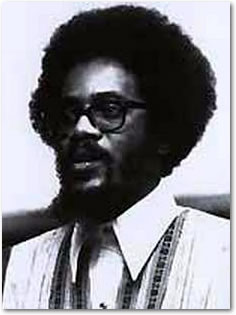Dr. Walter Rodney
March 23, 1942 – June 13, 1980
 Born to a working class family, Rodney was a bright student, attending Queen's College in Guyana and then attending university on a scholarship at the University of the West Indies in Jamaica, graduating in 1963.
Born to a working class family, Rodney was a bright student, attending Queen's College in Guyana and then attending university on a scholarship at the University of the West Indies in Jamaica, graduating in 1963.
Rodney earned his PhD in 1966 at the School of Oriental and African Studies in London, England. His dissertation focused on the slave trade on the upper Guinea coast. The paper was published in 1970 under the name, A History of the Upper Guinea Coast, 1545-1800 and it was widely acclaimed for its originality in challenging the conventional wisdom on the area.
He travelled widely and became very well known around the world as an activist and scholar. He taught for a time in Tanzania after graduating, and later in Jamaica at his alma mater - UWI Mona. Rodney was sharply critical of the middle class for its role in the post-independence Caribbean. When the Jamaican government, led by Hugh Shearer, banned him from ever returning to the country in October 1968, because of his advocacy of the working poor in that country, riots broke out, eventually claiming the lives of several people and causing millions of dollars in damages. These riots, on October 16, 1968 are now known as the Rodney Riots, and they triggered an increase in political awareness across the Caribbean especially among the Afrocentric Rastafarian sector of Jamaica, documented in his book "The groundings with my brothers ."
."
Rodney became a prominent Pan-Africanist, and was important in the Black Power movement in the Caribbean and North america. While living in Dar es Salaam he was influential in developing a new centre of African learning and discussion.
His most influential book was How Europe Underdeveloped Africa , published in 1972. In it he attempted and succeeded to portray an Africa which had been consciously exploited by European imperialists, leading directly to the modern underdevelopment of most of the continent. The book became enormously influential as well as controversial. In recent years the book has become discredited by some because of its perceived idealization of pre-colonial Africa.
, published in 1972. In it he attempted and succeeded to portray an Africa which had been consciously exploited by European imperialists, leading directly to the modern underdevelopment of most of the continent. The book became enormously influential as well as controversial. In recent years the book has become discredited by some because of its perceived idealization of pre-colonial Africa.
In 1974 Rodney returned to Guyana from Tanzania. He was supposed to take a position as a professor at the University of Guyana but the government prevented his appointment. He became increasingly active in politics, forming the Working People's Alliance, against the PNC government. In 1979 he was arrested and charged with arson after two government offices were burned.
Rodney was killed in a bomb explosion while running for office in Guyanese elections. The bomb was disguised as a two way radio transmitter and was planted by an agent of President Forbes Burnham The perpetrator secretly fled to Suriname thus avoiding prosecution. Rodney was survived by his wife Pat and three children.
In 2004, his widow, Patricia, and children donated his papers to the Robert L. Woodruff Library of the Atlanta University Center
